Along with coffee, tea, and other energy-boosting beverages, energy drinks are among the best boost sources.
It’s no surprise that it’s pushed in sports and marketed to employees, fitness fanatics, and even university students. Energy drinks are for everyone who wants to take their game to the next level.
However, the clamor over energy drinks is accompanied by health issues, such as how it may significantly alter and pose health dangers such as palpitations and jitteriness as side effects.
That is why, in this article, I will explain what causes jitteriness, and other negative impacts energy drinks have on our health, as well as recommend a list of energy drinks that won’t give you the jitters.
Let’s start!
Short answer: I usually advise that you go with energy drinks that are low on caffeine, like Mountain Dew Kickstart, Red Bull, Guru and Monster Energy. These energy drinks provide you the boost you need without giving you the jitters!
For a deeper explanation, keep reading.
Contents
What Causes Jitters?
Jitters are caused by the boost in adrenaline caffeine gives you. A rise in adrenaline causes your heart to beat quicker and your body to go into fight-or-flight mode when you are scared.
It’s also important to know that when coffee or its metabolites prevent adenosine from doing its job, levels of dopamine and other neurotransmitters rise, leading to higher neuronal activity in the brain and on the heart. This elevates blood pressure and heart rate.
To know more about caffeine and its effects, take a look at this video by Science Insider:
Do Energy Drinks Make You Jittery?
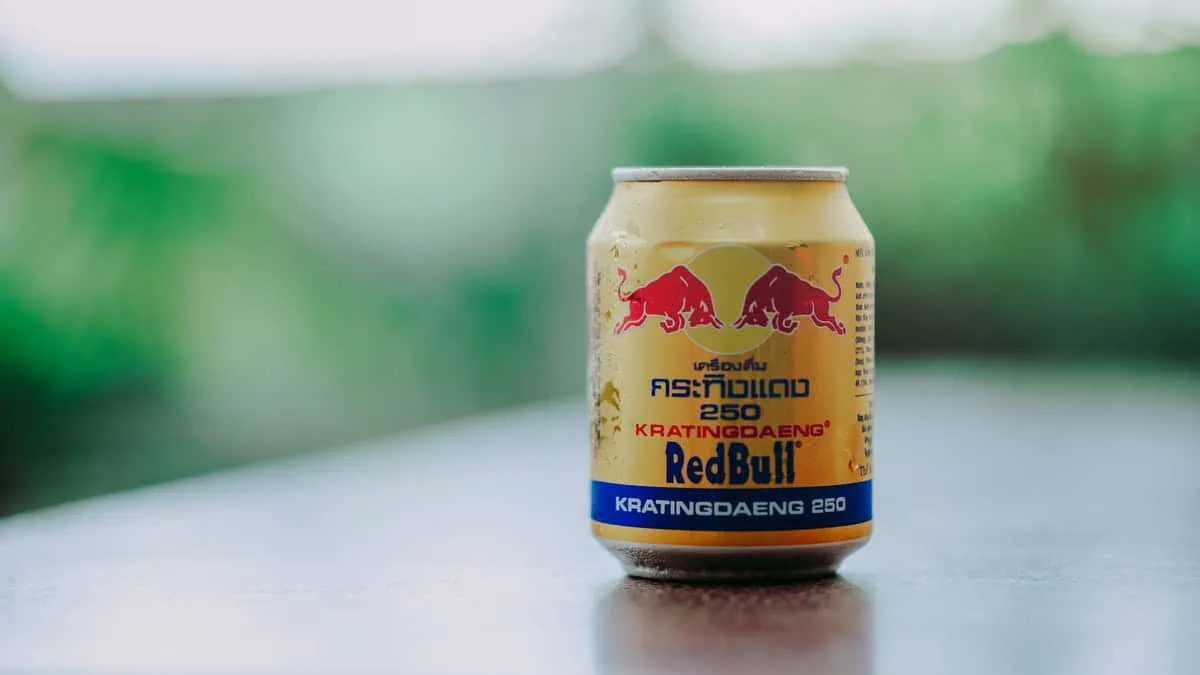
Jitteriness is a side effect of too much caffeine and since caffeine is a key ingredient of energy drinks, drinking too many energy drinks can make you jittery.
The caffeine or sugar mixed into the formula provides the majority of the energy in energy drinks.
Sugar is a carbohydrate that converts to energy. Still, caffeine is a stimulant that inhibits adenosine receptors (chemicals in our brain that cause us to sleep), making us feel more alert and awake.
When eaten in excess, these substances might have negative side effects. When consumed in large quantities, sugar can cause adverse effects such as acne, diabetes, obesity, and tooth damage. Caffeine causes jitters, anxiety, sleeplessness, and even hallucinations when used excessively.
That is why dieticians have advised us against consuming too many energy drinks. Because these beverages only give transitory advantages, they lack nutritional content. They might be harmful in the long run if not consumed in the proper dosage or taken regularly.
What’s the Right Amount of Sugar and Caffeine?
The American Heart Association (AHA) recommends a serving size of 9 teaspoons of sugar (36 grams or 150 calories) for males and 6 teaspoons of sugar (25 grams or 100 calories) for women.
In terms of caffeine consumption, the FDA recommends no more than 400mg per day (approximately 5 cups of coffee) for healthy individuals. While everyone reacts differently to caffeine, it is essential to determine how much caffeine you can handle. For example, if you have a poor tolerance for caffeine, 50-100mg will suffice.
What are the symptoms of caffeine sensitivity?
Caffeine’s energizing properties have made it popular not just among athletes, but also among students and professionals since it can aid with attention and cognitive performance.
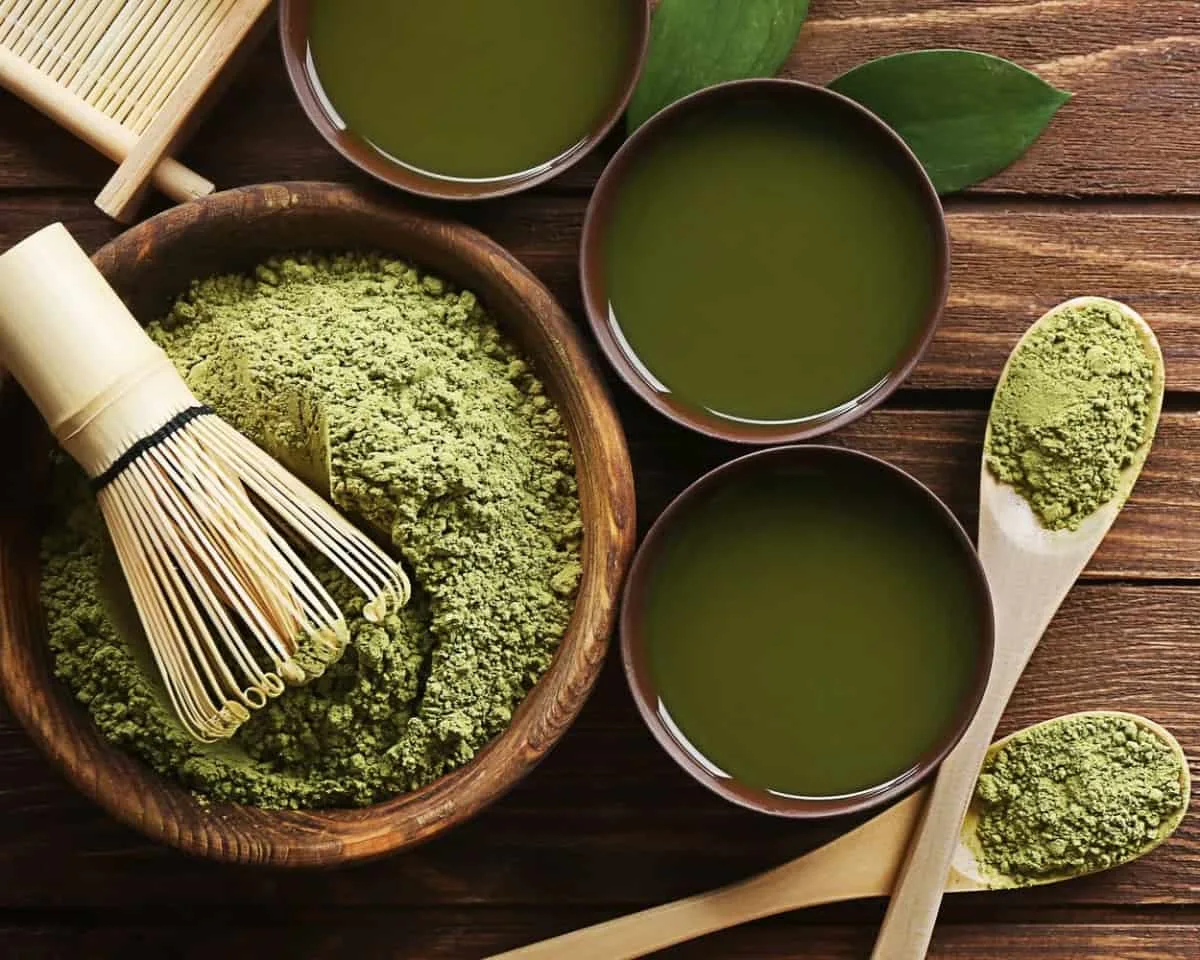
Caffeine may be a lifeline for some, but it is lethal to others. Caffeine sensitivity individuals may exhibit symptoms fast, even when subjected to modest doses of caffeine.
Some symptoms include:
- Palpitations
- Headache
- Jitters
- Nervousness
- Anxiousness
And in worse cases:
- Hives
- Rashes
- Swelling of throat
- Anaphylaxis (difficulty breathing)
How can I get caffeine without jitters?
If you’re sensitive to caffeine and are looking to minimize jitters, there are several ways to consume caffeine without experiencing the negative side effects. Here are a few tips:
- Start with a low dose: If you’re new to caffeine or have a low tolerance, start with a small dose (e.g. 50mg) and gradually increase as needed.
- Choose decaf or low-caffeine options: If you enjoy coffee or tea, consider switching to decaf or low-caffeine options, or try herbal teas that don’t contain caffeine.
- Pair caffeine with protein and healthy fats: Consuming caffeine with protein and healthy fats can help slow down the absorption of caffeine and prevent a rapid spike in blood sugar levels, which can lead to jitters. Try pairing caffeine with nuts, seeds, or a hard-boiled egg.
- Stay hydrated: Dehydration can worsen the effects of caffeine and increase the likelihood of jitters. Make sure to stay hydrated by drinking plenty of water throughout the day.
- Choose natural sources of caffeine: Caffeine is found in a variety of natural sources, such as green tea, black tea, and dark chocolate. These sources contain lower amounts of caffeine than energy drinks and other caffeinated beverages and may be less likely to cause jitters.
Remember, it’s important to listen to your body and be mindful of any negative side effects when consuming caffeine. If you experience jitters or other negative side effects, try reducing your caffeine intake or switching to decaf options.
Do bananas stop caffeine jitters?
There is no scientific evidence to suggest that bananas specifically can help alleviate caffeine jitters. However, bananas are a good source of potassium, which can help regulate fluid balance in the body and may help reduce muscle cramps or twitching that can be associated with caffeine jitters.
If you’re experiencing caffeine jitters, there are several other strategies you can try to help alleviate the symptoms, such as reducing your caffeine intake, staying hydrated, and consuming protein and healthy fats with your caffeine source. If you continue to experience negative side effects, it’s best to speak with a healthcare professional for personalized advice.
Why do energy drinks make me shaky?
Energy drinks contain high amounts of caffeine and other stimulants, such as taurine and guarana, that can increase heart rate, blood pressure, and stimulate the nervous system. These effects can lead to feelings of shakiness or jitteriness, particularly if consumed in large amounts or if you are sensitive to caffeine.
Additionally, some energy drinks contain high amounts of sugar, which can cause a rapid spike in blood sugar levels followed by a crash, leading to feelings of shakiness and fatigue.
If you are experiencing shakiness after consuming energy drinks, it’s a good idea to reduce your intake or avoid them altogether, as this could be a sign that your body is sensitive to the high amounts of caffeine and other stimulants. Alternatively, try reducing your caffeine intake by switching to decaf or low-caffeine options, or consult with a healthcare professional for personalized advice.
How do you get rid of caffeine sensitivity?
You can get rid of caffeine sensitivity by reducing your caffeine consumption or eliminating it from your diet completely. If you suffer from sleeplessness or anxiety, you can take medicines or see your attending physician.
The best approach to manage caffeine sensitivity is to understand and be aware of how caffeine affects your health.

However, in severe situations, you should see your doctor for further treatment. Because caffeine intoxication, if not treated promptly, can lead to a more dangerous consequence.
Caffeine exits your system fully after 12 hours, with half of it leaving your system 5 hours after ingestion. Here are some suggestions to help you avoid the negative effects of caffeine:
- Stop consuming caffeine as soon as you feel the side effects
- If you don’t want to endure insomnia, stop drinking caffeine 6-8 hours before going to bed.
- Drink lots of water
- Stay active
- Do breathing exercises
- Eat foods rich in fiber
The Best Energy Drinks Without the Jitters
Energy drinks are no different from caffeine-containing beverages. However, because the impacts caffeine may have on everyone have been a matter of controversy among health experts, energy drink manufacturers have devised a method to offer the stimulating sensation of their product while causing or limiting caffeine’s effects.
Some energy drinks contain up to 350mg of caffeine, which is close to the daily maximum recommended by the FDA (400mg).
That’s why I’ve compiled a list of the finest energy drinks with a minimum caffeine content that won’t give you the jitters. You may boost your energy levels in this manner without having to worry about the jitters.
Without further ado, let’s get to the list!
| Mountain Dew Kickstart (16 fl. oz) | Red Bull (8.4 fl. oz) | Guru (8.4 fl. oz) | Monster (16 fl. oz) | |
| Caffeine | 90mg | 80mg | 100mg | 160mg |
| Calories | 80 calories | 110 calories | 80 calories | 210 calories |
| Sugar | 20g | 27g | 21g | 54g |
Mountain Dew Kickstart
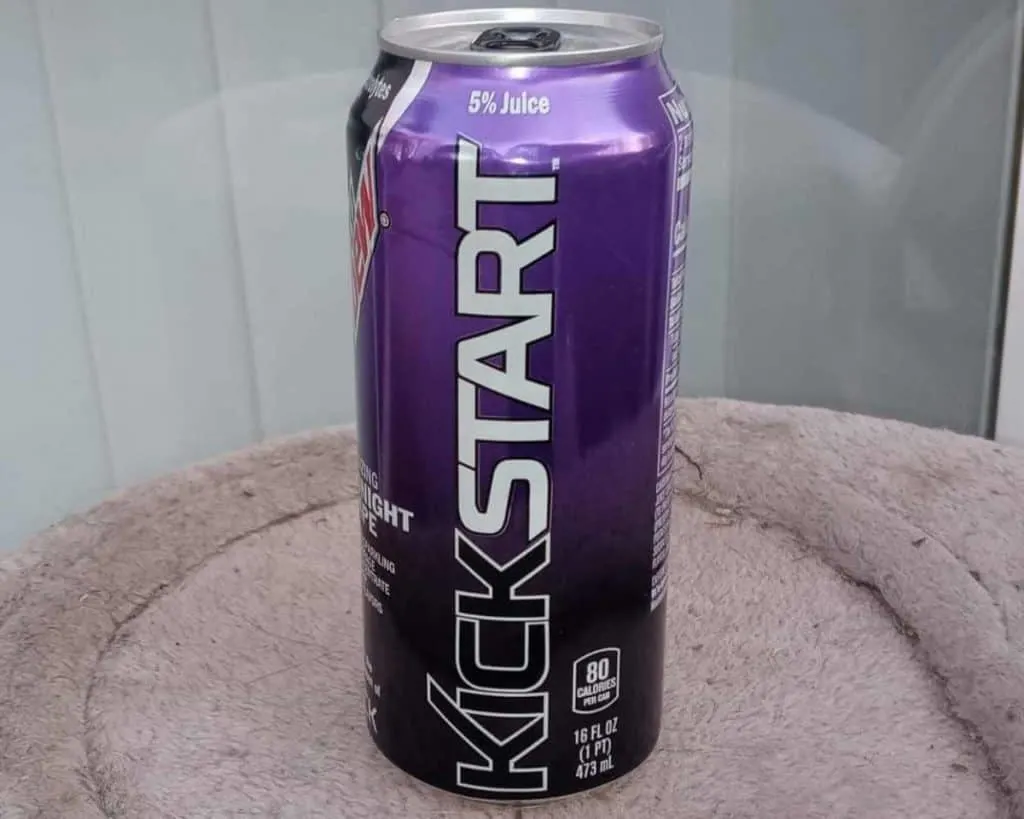
- Caffeine content: 90mg
- Calorie content: 80 calories
- Sugar content: 20g
Mountain Dew Kickstart contains a balanced quantity of caffeine and sugars while still providing the energy boost you’re looking for.
In terms of flavor, I appreciate that this drink retains the traditional taste of Mountain Dew soda. Furthermore, the brand provides a broad variety of delectable tangy fruit tastes.
Red Bull
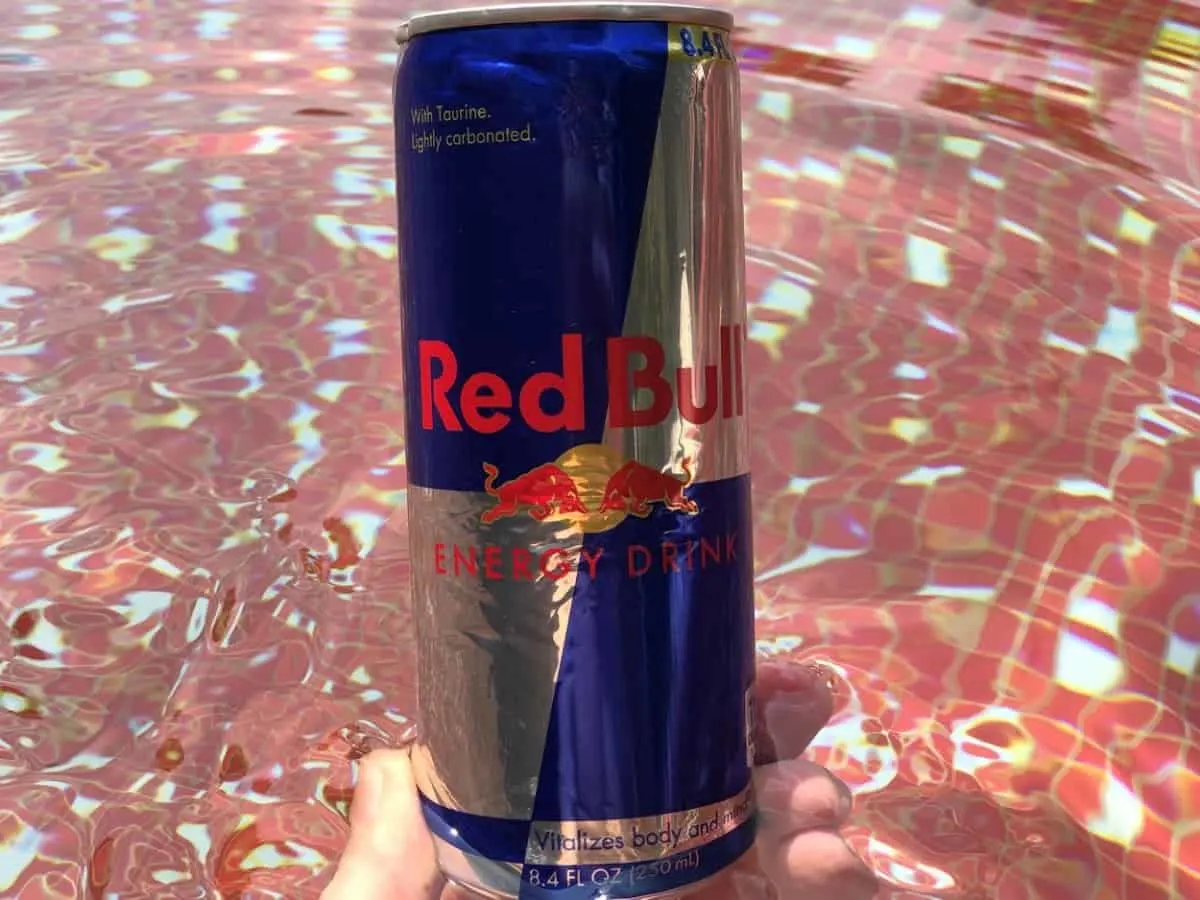
- Caffeine content: 80mg
- Calorie content: 110 calories
- Sugar content: 27g
A single 8.4 fl. oz. can of Red Bull has 110 calories, 27g of sugar, and 80mg of caffeine, as well as a few additional components, including taurine, salt, and B-Vitamins.
The sole disadvantage of Red Bull is its high sugar level. However, if you consume Red Bull in the proper amount, it will unquestionably boost your energy levels (bullish style).
Guru Energy
- Caffeine content: 100mg
- Calorie content: 80 calories
- Sugar content: 21
Guru has a reputation as being a healthier energy drink brand, and I have to agree that it is probably much better than some more well-known brands with its reasonable caffeine, moderate calories and not excessive sugar content.
With 100mg of caffeine, you’ll enjoy a nice boost, but won’t get any jitters unless you’re particularly sensitive to caffeine.
Monster Energy
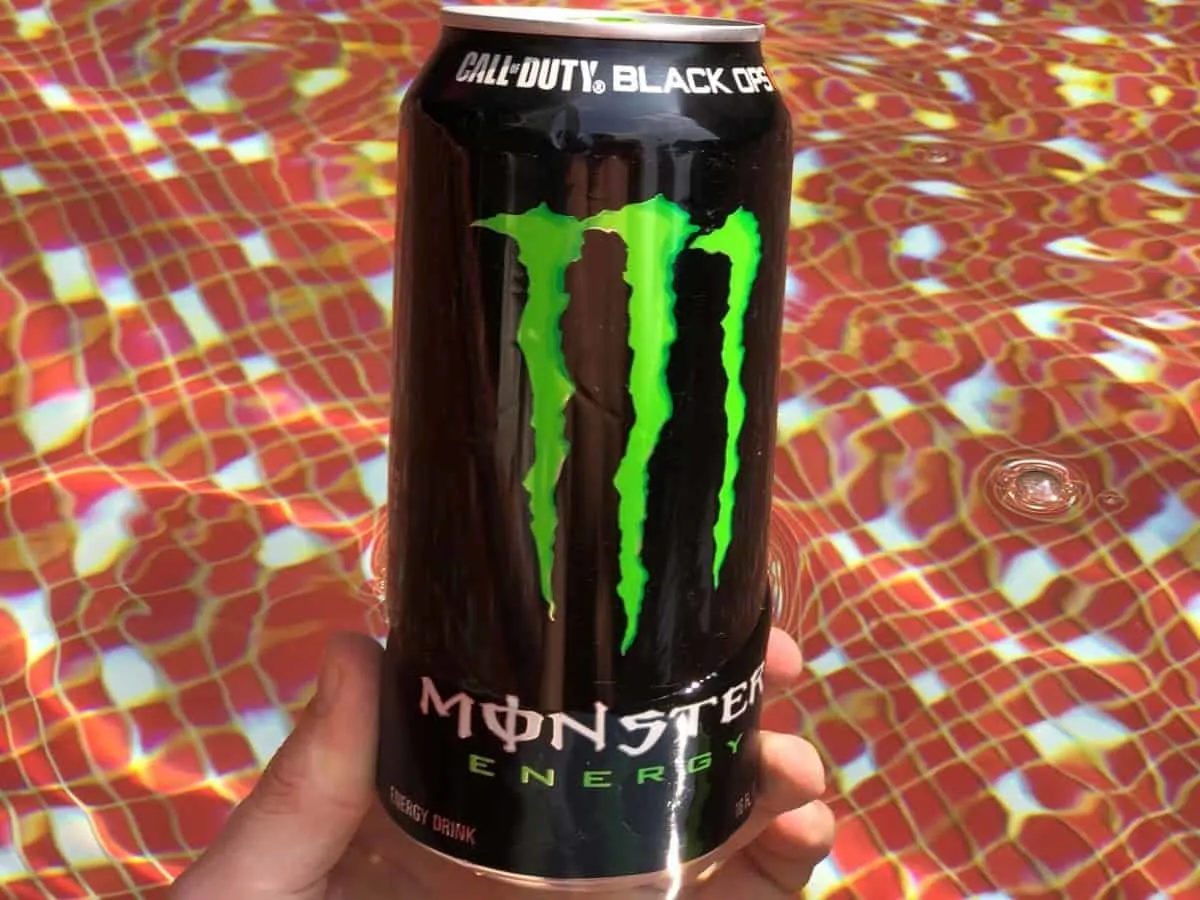
- Caffeine content: 160mg
- Calorie content: 210 calories
- Sugar content: 54g
Monster has a considerable quantity of caffeine, but it’s also high in sugar and calories, so keep that in mind. Monster Energy, on the other hand, is your best bet if you’re looking for a sugar and caffeine surge to take your game to the next level.
Are Energy Drinks Bad For You?
Energy drinks are neither totally bad for you nor are they entirely good for you. . In essence, energy drinks are supplements that temporarily alleviate tiredness or fatigue.
Energy drinks include sugars and caffeine, which, if consumed in excess, are the cause of the majority of unpleasant effects that people may suffer depending on their tolerance for the components.
In terms of health, the healthiest approach to prevent the symptoms caused by energy drinks is to consume them in moderation and not rely only on them to meet your energy needs.
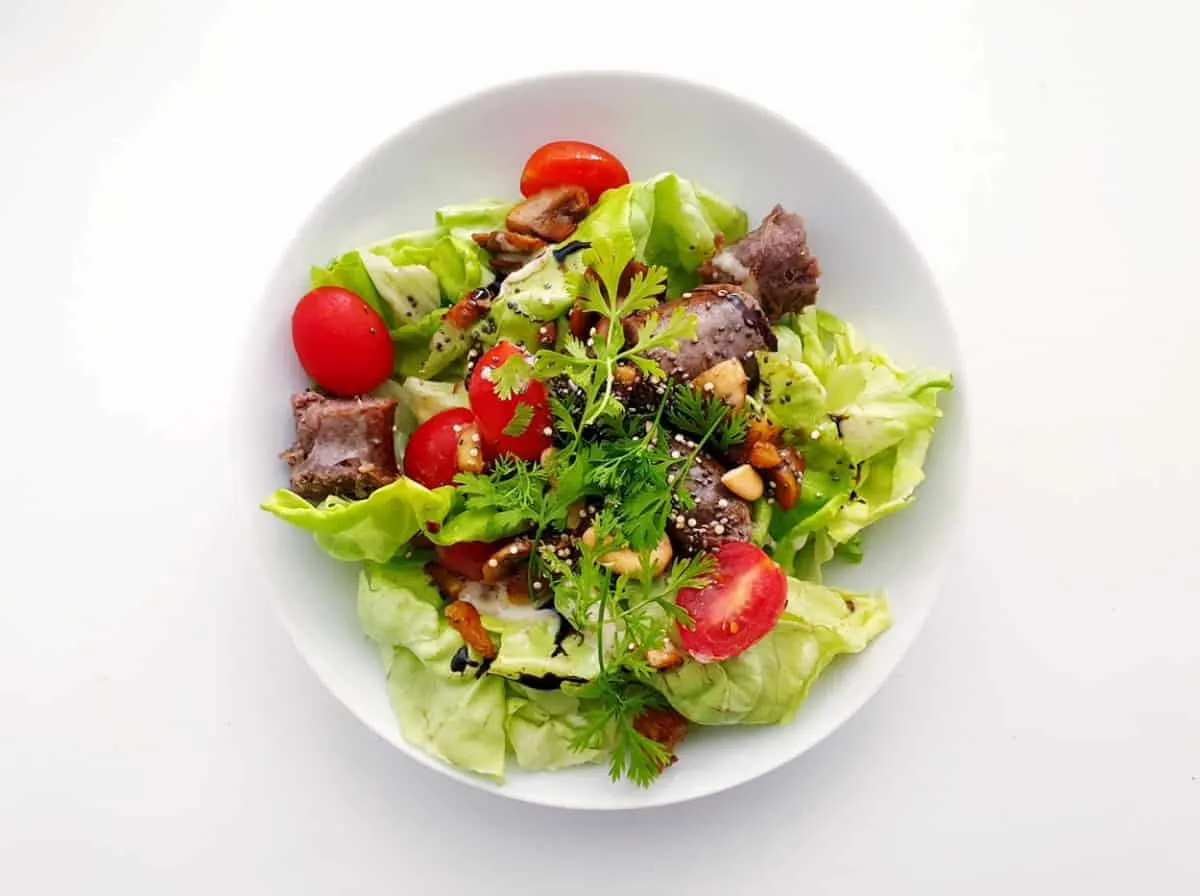
Maintaining a healthy and balanced diet and lifestyle as much as possible is still the greatest way to raise your energy and enhance your health in the long run.
However, if you’re still wondering what other options there are to alleviate your temporary fatigue, you may try these beverages, which you can even brew at home.
- Coffee
- Green tea
- Yerba mate
- Lemon water
- Ginger tea
How Often Should You Drink Energy Drinks?
Drinking one can of an energy drink per day is plenty for healthy individuals. However, this does not imply that you should consume a can of energy drink every day. Drink energy drinks only when absolutely necessary.
Moreover, consuming too much caffeine on a daily basis may cause you to develop a tolerance for it, which means you’ll suffer jitters and other caffeine side effects that may be tough to overcome.
As such, while Raze may be great for the occasional boost, it’s certainly not an energy drink I would recommend having day-to-day; stick with energy drinks lower on the caffeine instead, or coffee or tea if you’re feeling a tad healthier.
For a more comprehensive explanation of how energy drinks can impact you if drunk every day, here’s a video you can watch:
Conclusion
Energy drinks can be beneficial in certain ways while potentially being detrimental in others. Adverse consequences are unavoidable with anything eaten in excess…such as caffeine.
Jitters, anxiety, and sleeplessness are just a few of the symptoms that caffeine may cause, so it’s critical that you understand how much caffeine might impact you.
You should be careful in the amount of caffeine you are putting in your body or pay close attention to the caffeine content that is in your drinks to avoid having to face these symptoms.
